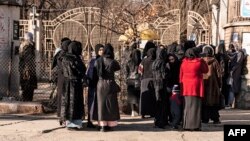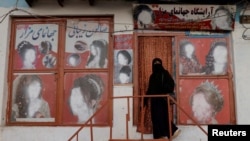The United Nations says Taliban authorities in Afghanistan continue to arbitrarily arrest and detain individuals suspected of being opposition forces and journalists, in addition to increasing restrictions on women's access to work and education.
The U.N. Assistance Mission in Afghanistan, or UNAMA, has documented the alleged human rights violations in a new report published Monday covering developments in May and June.
Taliban chief spokesman Zabihullah Mujahid swiftly rejected the findings, claiming they are based on "false information" being propagated by loyalists of the former Afghan government.
The UNAMA report recorded instances where the Taliban enforced previously announced limitations on women's freedom of movement and searches for employment.
It cited a Taliban Ministry of Public Health directive in early May that allowed only males to take exams and pursue specialized medical studies.
The Taliban have banned teenage girls from attending schools beyond the sixth grade and blocked female students from attending university classes since last December.
"On 1 May, at an airport, two Afghan female staff of an [international nongovernmental organization] were arrested by de facto police because they were travelling without a mahram [male guardian],” UNAMA said in the report.
In June, the Taliban's intelligence service detained a midwife and interrogated her for five hours before threatening her with death if she continued her work with a nongovernmental organization, UNAMA said, adding that the woman resigned two days later.
"The severe restrictions on Afghan women working with the United Nations continue to impact the work of the organization. With limited exceptions, since 5 April 2023, all Afghan UNAMA staff — women and men — continue to work from home to prevent a discriminatory approach in the workplace," the report said.
The Taliban have barred women from visiting public parks, gyms and public bathhouses. The Ministry for the Propagation of Virtue and the Prevention of Vice has recently ordered hundreds of female-run beauty parlors across the impoverished country to close within a month, alleging they were offering services prohibited under Shariah, or Islamic law.
The move has effectively rendered tens of thousands of Afghan women jobless, according to owners and employees of beauty salons.
Monday’s UNAMA report noted that the detainee population in Afghan prisons nationwide had reached approximately 15,000 people, an increase from the average of 10,000 that the Taliban prison administration department has aimed to maintain since mid-2023.
Detainees included women and girls who have finished their sentences or had been previously identified for release but lack male guardians to whom they can be released, according to UNAMA.
"Arbitrary arrests and detentions of former government and military personnel — often accused of affiliation with the National Resistance Front — are also ongoing, particularly in Kabul and Panjshir provinces," the report said.
The National Resistance Front is waging armed resistance against the Taliban from mountain hideouts in Panjshir and surrounding areas. It occasionally conducts guerilla raids on Taliban fighters but has not been able to pose any significant challenge.
"The de facto authorities continue to arbitrarily arrest and detain journalists," UNAMA said. The Taliban morality police arrested four journalists in early May in the southeastern Afghan city of Khost. The detainees were instructed not to publish news reports against the Taliban, before being freed three days later.
Mortaza Behboudi, a French-Afghan journalist, was arrested on January 7 and remained in the custody of Taliban intelligence services in Kabul for unknown charges, the report said.
Mujahid claimed in his statement on Twitter that individuals within UNAMA could be misusing the organization to support a propaganda campaign against the Taliban. He added that Taliban security forces are working hard to ensure public safety, and all state institutions are busy serving the Afghan nation.
"The positive situation demands that the U.N. stop publishing such negative reports,” Mujahid stated.
The fundamentalist de facto Taliban authorities have rejected criticism of their policies, insisting they govern Afghanistan in accordance with local culture and Shariah.
The UNAMA report said that instances of judicial corporal punishment, implemented based on a court order and usually carried out in a public venue, continued in May and June, despite international calls for ending the practice. Scores of people, including women, have been publicly flogged, and at least two people, convicted of murder, have been executed in front of onlookers since the Taliban seized power in August 2021.
The international community has not recognized the Taliban government because of its treatment of Afghan women and other human rights concerns. The hard-line group returned to power nearly two years ago when all American and NATO troops withdrew from the country after nearly two decades of involvement in the Afghan war.





